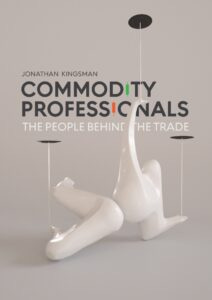Mike works with Sybius, a boutique consultancy firm offering compliance services to the commodity trading and financial sector. Before joining Sybius, Mike worked for 16 years with Cargill, most recently as compliance director for derivatives and commodities.
"My job at Cargill was in the trading compliance areas," he told me. "I specialised in the intersection between trading in physical commodities and trading in financial instruments on regulated markets.
"The intersection usually occurs when pricing the physical transaction. If you sell wheat and your customer prices it against the Chicago futures, are you acting as a futures broker or providing investment advice?
"No, neither of the two. A commodity trader like Cargill is not a financial institution but must comply with regulations when trading on regulated markets. My role was to ensure that we had internal policies and procedures to comply with these regulations. It included ensuring traders and others do not give the impression of acting as futures broker or providing investment advice."
Mike told me that he faced three main challenges in that role. The first was that he needed to understand the business. He had people in his group who were fantastic professionals from the world of finance, but they were new to the world of physical commodities. They had to quickly learn how it worked.
His second challenge was translating compliance in a way traders could understand.
His third challenge was the speed at which the regulatory landscape changed. He had been with Cargill for one year when Lehman Brothers collapsed. It was the kick-off for long-term change in the world of finance.
"It is an evolving space," he told me. "More regulation will come If we as an industry do not operate properly. There are ongoing discussions about how commodity firms should be regulated, particularly in Europe, the US, and elsewhere.
"Are there specific measures legislators are looking to introduce?" I asked.
"Regulation will come into our sector through the financial markets," he replied. "One suggestion is to introduce capital requirements. If you want to take risks in the market, you need to have the necessary capital resources.
"The US, EU and other jurisdictions already restrict risk-taking by limiting the size of traders' positions on a futures exchange. The exchanges already impose financing requirements through initial and variation margins.
"Europe is also approaching the question through the lens of market abuse and conduct, looking at how traders hedge their physical transactions. A trading book will have a portfolio of positions without a one-to-one relationship between them. From a regulatory perspective, it has the potential to be vulnerable to abuse.
"Don't expect compliance to go away," Mike warned. "The more you embrace it, the easier it will be to deal with."
"Do you think physical brokers will ever be regulated?" I asked. I had often asked myself this question during my years as a physical broker.
"I believe they could be," Mike replied. "The regulators are looking at physical brokers in standardised contracts such as sunflower oil in Europe or the Mississippi barge market in the US. They could ask whether they are physical cargoes or standardised financial instruments."
I have often argued that the agricultural business is largely privatised and has less room for corruption than in the oil and mining industries, where governments grant licences and permits. I asked Mike if he agreed.
"The US and Europe have already imposed massive fines for bribery and corruption," Mike countered, "albeit in the oil sector and for events many years ago.
"But think about cocoa," Mike continued. "You're buying from government entities in both Ghana and Ivory Coast. If you sell soybeans to China, your buyers may be state-owned companies. Countries like Iran, Nigeria, and Algeria also buy through state companies. The magnitude is less than oil's, but you are still vulnerable in agriculture."
"Does compliance cover reputation as well?" I asked. "Would that come under your remit?"
"Everybody in a company is responsible for its reputation. A single trader can destroy a hundreds-of-year-old company in a second. As such, senior management, divisional managers, all employees, and even beyond, like contractors—rather than just compliance officers—need to look out for reputational risk. "
"But what about legal compliance?" I asked. "There seems to be a fuzzy frontier between compliance and legal."
"Compliance starts where legal compliance ends," Mike answered. "Legal compliance clearly defines what a company can and can't do. However, there are grey areas in the legal world, and that's where compliance starts. Compliance, for me, means managing the grey. We need to figure out the middle. It's where the problems start and where risk assessment kicks in. It defines how much risk a company may be willing to take."
"There's so much legislation, and it's changing all the time," I said. "Cargill operates in so many countries; how do they keep up with it all?"
"Large commodity traders clearly define multiple compliance areas such as sanctions, competition, anti-bribery, food safety, etc," he replied. "You must organise and structure it. And you have priorities within each function. It's a volume problem and a prioritisation problem.
"You must also do a risk assessment depending on your area of compliance. If it is competition law, you must look in every country where you operate. If it's futures trading, you look at the countries where you trade the futures and where the futures exchanges are located. You have plenty of people following the rules. However, digesting that information can be a challenge."
"Doesn't that make it harder for you, Mike, now that you are in a smaller organisation?" I asked. "How do you track all that information and ensure you're up to speed?"
"It is a good question," he replied. "I agree I don't have the resources I had at Cargill, but information today is much more available than it was twenty years ago. We are linked to a lot of trading organisations and have a network of people with whom we share information
"I'm not advising the Cargills of this world. Smaller organisations have different risk profiles. When you have a specific client, you go through the list of things they're exposed to and focus on those. It reduces your workload. Besides, I advise more on compliance strategies and structures – how you can practically deal with your risks – than on day-to-day activities.
"There is another element here. You get into a routine working for one company and can become a victim of groupthink, attached to a particular way of seeing and doing things. As a consultant, I am exposed to a variety of views. I am no longer factually and emotionally attached to one pre-determinate view. I believe it is called 'non-attachment' in advanced organisational thinking."
"Where does compliance end and risk management start?" I asked. "Is compliance a subcategory of risk management?"
"Too many people in the commodity world misunderstand risk management," he replied. "They too often think risk management is market risk management, but there are many other risk areas you need to consider. Risk management is mitigating the risks in your business activity, irrespective of where they're coming from.
"You have market, compliance, counterparty, funding, and financing risks. People in accounting have to manage risk. There is a whole range of risks in trade execution. You have cyber security and IT risks. You have fraud and payment risks. The people responsible for managing these risks are not necessarily in compliance, but compliance provides a framework and interacts at every level of risk management.
I saw on his LinkedIn profile that Mike had experience in forensic accounting.
"Forensic activities, not forensic accounting," he corrected me. "Forensic activities are part of the compliance role. I'm not examining a crime and how a person died, but there is a comparison. We try to understand what happened and see if it is still happening. We try to find patterns. It is an intense role, but it is a crucial part of compliance to prevent further damage to the company.
"It may also lead to an improvement in trading activities. Suppose you are not contravening any market regulations but still move the market when you hedge a physical transaction. In that case, our forensic activity can highlight possible ways to improve your hedge execution. It is the advantage of business-oriented compliance."
"Is this something that artificial intelligence could help with?" I asked. "It seems an obvious candidate for artificial intelligence."
"Absolutely," he replied. "It's an example of where artificial intelligence can help. Regulators already use or at least consider the use of AI extensively.
"The only issue is that AI doesn't tell you what it did, how it did it, or if it did everything. It can be challenging from a regulatory perspective.
"One downside is that AI can send out too many false positives. As a compliance officer, you must confirm and document that every false positive is false."
"What are the best and the worst things about being a compliance officer?" I asked
"The best thing is I can look into everything and learn about the business. Today, risk management is natural for me, for example, but I discovered it through the compliance journey.
"The worst thing is that traders often view you as a 'no-sayer'. I have had to learn not to say 'no' too quickly, and I am still learning. Looking back, I have often said 'no' too quickly. Traders are not doing things wrong intentionally – some do, but the vast majority don't.
"Even so, it takes courage and resilience to say 'no' when everyone wants you to say 'yes'."
"Are you a policeman or a detective?" I asked.
"I am neither," Mike replied. "People often think of us as the police, but if we do our role correctly, we are more of a business enabler. We ensure the business can continue to operate and has the license to operate. In one sense, we are policemen who protect that licence to operate. In another sense, we set up the processes that facilitate business. We are an enabler.
"I like to think of myself as more of a harbour pilot," he continued. "If I were a policeman, I would keep the vessel miles from the coast. A pilot's role is to navigate the ship through the rocks and keep the business safe. If you need to slow down, you slow down but speed up when you can.
"People in the trading world should see their compliance people as partners, not policemen. They're there to help you, keep the business functioning, and keep you out of jail."
© Commodity Conversations® 2024
This is an extract from my upcoming book, Commodity Professionals – The People Behind the Trade.




